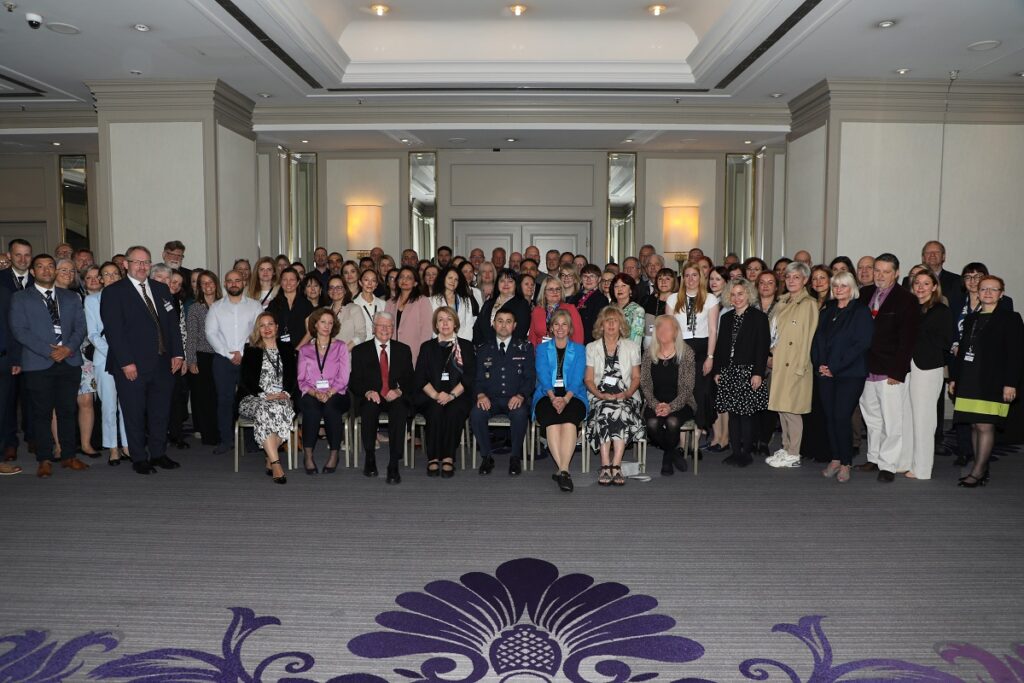
Day 1
- BILC Information and update, Irena PRPIC DJURIC, HRV
- STANAG 6001 Working Group, Julie DUBEAU, CAN
- JTAC Working Group, Peggy GARZA, USA
- Shared Item Bank Project, Suzana HORVAT, HRV
- Pragmatics: The Challenge of Meaning (and Understanding) More than is Said, Dr. Ray CLIFFORD, USA
- Recognising and Applying New Paradigms in a Changing Educational Environment, Gabriella KISS, HUN
- Building Standardization and Interoperability through Cooperation: DEEP Perspective, Branka PETEK, NATO
Day 2
- Interwoven Threads: Exploring the Nexus of Languages, Security and Technology, Agata JAGIELLO-TONDERA,POL
- Wargames and Serious Games in Military Language Training and Beyond, Dr. Christoph LORECK, DEU
- AI in English teaching: still a long journey ahead, Christophe BORTOLETTO, FRA
Day 3
- To Use or not to Use AI in the English Language Classroom, Teodora IVANOVA, BGR
- ChatGPT and Beyond: AI’s Impact on English Language Teaching and Learning, Irene PÉREZ GARACHANA, ESP
- English for Space Operations: An expanding universe, an expanding project, Angela Ruth LOGUE, ITA
- Balancing Adaptation and Standardization to Maximize Results, Sophie NORMANDIN, CAN
- Continuous Professional Development at the Danish Armed Forces Foreign-Languages Academy; from Recruitment to Retention, Kåre KILDEVANG, DNK
Day 4
- Understanding Linguistic Diversity from a Syllabus Design Perspective, Annette NOLAN, SWE
- Bridging the Gap: Challenges in Designing Military English Materials for Academic Setting, Tea GLAVAŠ & Milena PROŠIĆ, HRV
- Incorporating ‘military flavour’ into STANAG 6001 tests, Tamara KRAMARIĆ MARAS & Kristina SERDOZ, HRV
- Overcoming the Lack of Teaching Resources Through Creativity: Lessons Learned from Military German Courses in Croatia, Iva GUGO, HRV
- From Paper to Platform: Embracing AI and CALT in Military Language Testing, Tamar SHAVLAKADZE, GEO
Study Groups
- SG#1 Ethical and Security Considerations in AI Deployment (Facilitators: Ms. Cristina Bordianu, Ms. Tatjana Klobučar and Mr. Allan Juhl Kristensen)
- SG#2 AI and the Future of Formal Military Communication: Challenges and Strategies for Teaching and Writing at Higher Proficiency Levels – 2 subgroups (Facilitators: Ms. Tea Glavaš, Ms. Milena Prošić, Ms. Kristina Serdoz and Ms. Iva Gugo)
- SG#3 Inclusive Teaching and Testing in the Military Context: Addressing Dyslexia and Other Learning and Communication Challenges (Facilitators: Ms. Jessica Geijer and Mr. Koen Heylen
- SG#4 Revision of the BILC Terms of Reference (Facilitator: Ms. Branka Petek)
Summaries
- Recognising and Applying New Paradigms in a Changing Educational Environment, Gabriella KISS, HUN
- Interwoven Threads: Exploring the Nexus of Languages, Security and Technology, Agata JAGIELLO-TONDERA,POL
- AI in English teaching: still a long journey ahead, Christophe BORTOLETTO, FRA
- To Use or not to Use AI in the English Language Classroom, Teodora IVANOVA, BGR
- ChatGPT and Beyond: AI’s Impact on English Language Teaching and Learning, Irene PÉREZ GARACHANA, ESP
- Balancing Adaptation and Standardization to Maximize Results, Sophie NORMANDIN, CAN
- Continuous Professional Development at the Danish Armed Forces Foreign-Languages Academy; from Recruitment to Retention, Kåre KILDEVANG, DNK
- Bridging the Gap: Challenges in Designing Military English Materials for Academic Setting, Tea GLAVAŠ & Milena PROŠIĆ, HRV
- Overcoming the Lack of Teaching Resources Through Creativity: Lessons Learned from Military German Courses in Croatia, Iva GUGO, HRV
- Incorporating ‘military flavour’ into STANAG 6001 tests, Tamara KRAMARIĆ MARAS & Kristina SERDOZ, HRV
- From Paper to Platform: Embracing AI and CALT in Military Language Testing, Tamar SHAVLAKADZE, GEO
- Building Standardization and Interoperability through Cooperation: DEEP Perspective, Branka PETEK, NATO